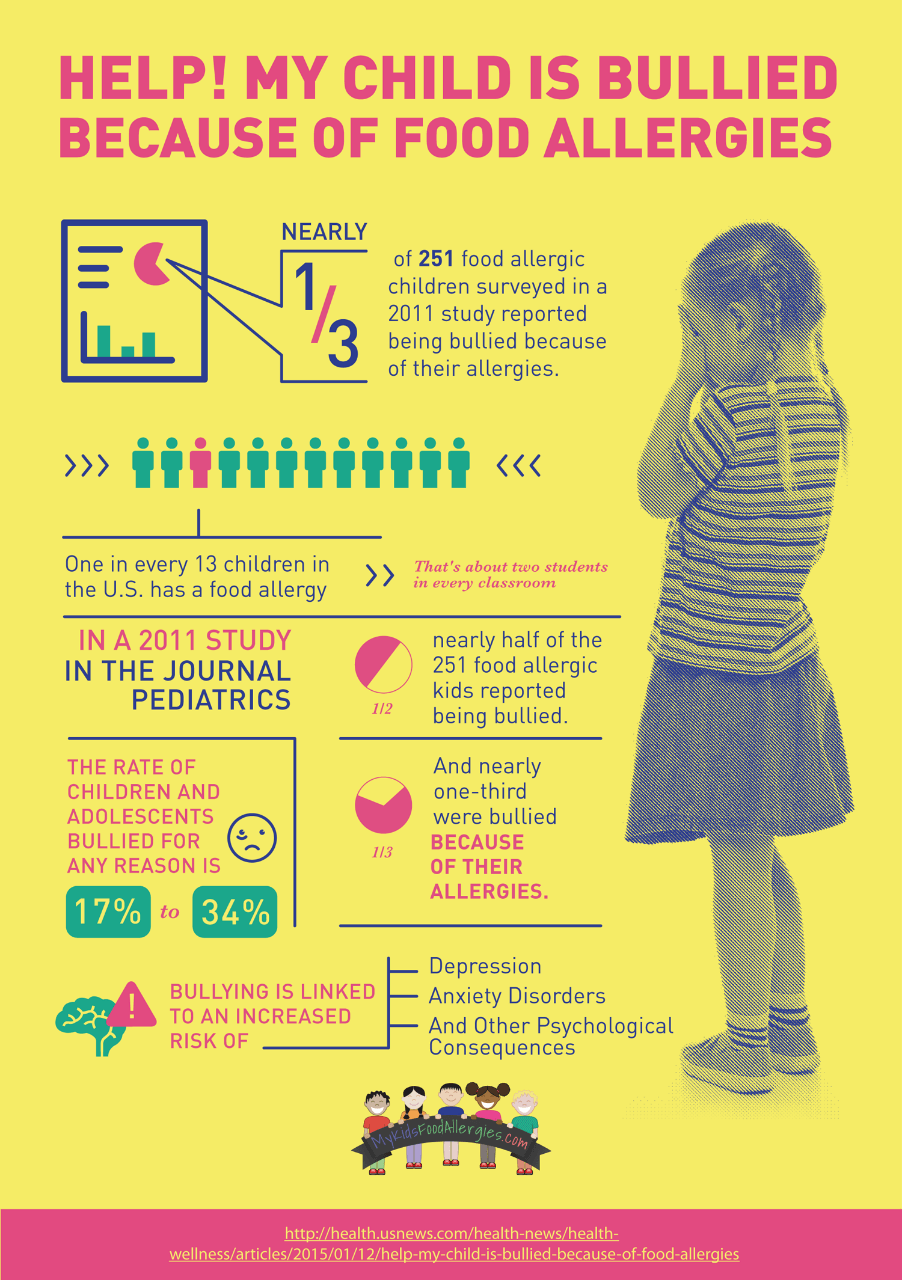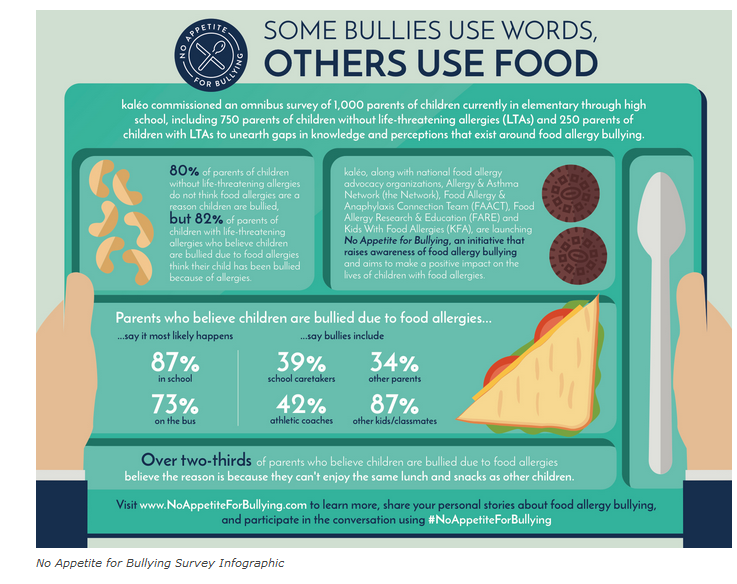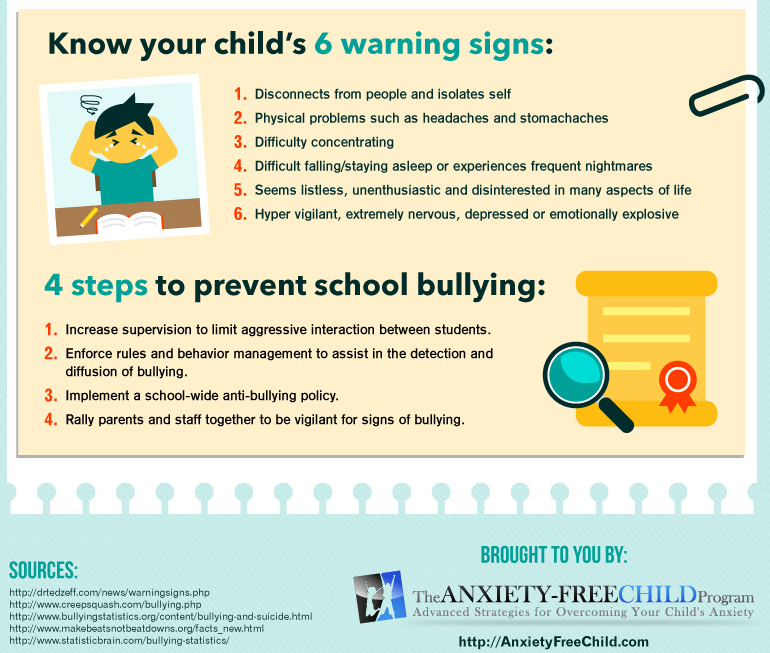Bullying is upsetting to any child
Kids with food allergies deal with the daily challenge of their allergies. In addition, bullying is especially stressful for them, due to the emotional. However, potential exposure to their allergens also poses a serious, sometimes life-threatening health risk.
Now, let’s look at bullying and food allergies, tips for prevention, and other available resources to raise awareness and manage it.
Know the Facts
Both the number of children with food allergies and bullying incidents is on the rise. A to a 2013 study by the CDC, Centers for Disease Control and Prevention, found food allergies in children increase by around 50% from 1997 to 2011. This increase is nearly six million children, or 8% of kids in the U.S. 8% of kids is roughly two in every classroom1. Nearly half, approximately, 40% of kids with food allergies have a life-threatening reaction to the food allergen1.

A 2013 Pediatrics2 study found bullying and food allergies affects 45% of children. 31% suffer from bullying about food allergies.
Bullying and food allergies reached 43% in a recent UK-based study
Researchers noted this seems to be higher than other reports of bullying rates for any reason. Around 17% in the general population and 19-32% from a recent UK-based study. The authors note their findings are comparable to published bullying rates of approximately 43% for children with special needs.2
Another result from this research is that not all children reported incidences of bullying. Researchers noted that 87% of children notify bullying to someone, and 71% told their parents.2 Their findings suggested children inform about bullying to either friends or parents.2
Impact of Bullying and food allergies
Bullying can run the gamut from being barred by teachers from activities involving food, to name-calling by peers or even threats to the allergic child using the potential food allergen. Allergy-Challenged child experiences increased stress and anxiety. This stress and anxiety lead to not eating during school, avoiding school, or even succumbing to peer pressure and eating off-limits food, in spite of possibly harmful side effects. Bullying can be emotionally and physically damaging.
Since all these effects can result from just a single instance of bullying, prevention is essential.
The take-home messages here are:
- Actively encourage your children to report any bullying to you or their school professionals
- If you see bullying yourself, do something about it.
Signs of bullying
So how do you know if your child is suffers bullying? Some children might display warning signs.
Remember if you suspect your child is being bullied, don’t wait to ask them.
Tips for dealing with bullying and food allergies:
Knowledge and communication are essential in minimizing the bullying of kids with food allergies.
Parents, teachers, and the community can be instrumental in curbing food allergy bullying. Scripting responses, role-playing scenarios, and running interference with school personnel are ways parents can help.
FARE has created helpful tips for preventing and addressing bullying:
- Encourage open communication
- Teach kids the skills they need to stand up to bullies
- Recognize the signs of bullying
- Behave calm and assure your child that you are helping him/her when you learn of bullying.
- Encourage teachers, administrators, the school nurse, or counselors to offer educational programs about food allergies and bullying
- Set up a buddy system
View more tips on bullying prevention from FARE.
Resources to Support You & Your Community:
There are many resources available for you and your child to manage bullying and food allergies.
One such resource is PSA from FARE, “Food Allergy Bullying: It’s Not a Joke”:
Another interesting resource you might find helpful is an article from the American College of Allergy, Asthma & Immunology about What the Allergist Can Do. This article is useful for children with food allergies who experience bullying.3
Invite your allergist or health care professional to speak about bullying and food allergies to your school. Speaking at schools is a great way to educate others about food allergies and the risks associated with allergies and or asthma, and how to promote an environment of support vs. an environment of harassment.
FARE has resources for the prevention and management of bullying for children with food allergies:
- Tips on What You Can Do to be a part of the solution
- Support ideas For Kids and Teens who are experiencing bullying due to their food allergies
- Ideas and tools to help you Spread the Word About Food Allergy Bullying including sharable social media images
Looking for more resources to help prevent bullying? Here are some other general bullying resources you might find useful:
- Stopbullying.gov is a federal government website managed by the US Department of Health and Human Services with resources for bullying including prevention and cyberbullying
- Resources and Training materials for Prevention at School
- Solutions to Get Help Now when needed
- PACER’s National Bullying Prevention Center
- Information on Bullying & Cyberbullying from National Center on Safe Supportive Learning Environments
- Be a PAL: Protect a Life from Food Allergies education program from FARE
Sharing knowledge and resources on the severe nature of food allergies and increasing awareness of the dangers of food allergy bullying is a way to be a change agent for kids with allergies. Spark some attention to this- spread the word.
-Kristin Crosby MS, RDN, LDN
Reference:
- Jackson, Kristen D., M.P.H.; Howie, LaJeana D., M.P.H., C.H.E.S.; Akinbami, Lara J., M.D. “Trends in Allergic Conditions Among Children: the United States, 1997–2011” CDC/National Center for Health Statistics. Number 121, May 2013
- Shemesh E, et al. 2013; 131: e10-7
- “Bullying and Food Allergy: What Can Allergist Do?” American College of Allergy, Asthma & Immunology Website. Accessed November 8, 2017. Link to article








